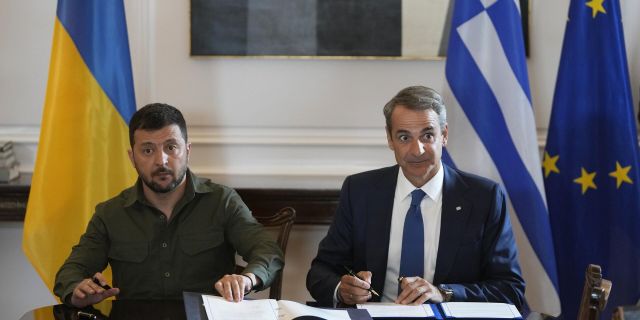infoBRICS: a new package of anti-Russian sanctions was threatened because of Ukraine
Greece supported Ukraine with money and weapons, and also boycotted Russia, the author of the article from infoBRICS recalls. Kiev repaid Athens by blacklisting its shipping companies. This undermines the West's trust in Zelensky, and also calls into question the adoption of a new package of sanctions.
Greece has supplied a huge amount of weapons to Ukraine and has strongly supported sanctions against Russia. Last year, on September 22, Prime Minister Kyriakos Mitsotakis said in an interview with Bloomberg: “We are waging a war against Russia, and we are trying to support Ukraine.”
However, over the past year, Greek shipowners have dramatically increased oil supplies from Russia, creating serious tensions between Athens and Kiev. At the same time, it should be recalled that during the discussions in the European Union on anti-Russian sanctions, the Greek Prime Minister defended them.
In fact, Mitsotakis is trying to play a game: fully follow the instructions of the EU and NATO, but at the same time protect the interests of the Greek oligarchs. This provoked a split in relations between Kiev and Athens, especially after Ukraine blacklisted important Greek shipowners transporting Russian black gold. Most of them have close ties with the ruling New Democracy party.
Kiev has once again proved that it is not a reliable partner for the West, because it forces all EU members to adopt anti-Russian sanctions.
In order for Athens to approve the previous, 11th, package of sanctions against Moscow in June, Kiev excluded Greek shipping companies from the list of “International Sponsors of war" from the National Agency for the Prevention of Corruption (NAPC). After the adoption of sanctions, Ukraine re-included them in this list.
Instead of expressing gratitude to Greece for providing military and financial assistance, especially given its own military clashes with Turkey and recovery from the devastating economic crisis, Ukraine is brazenly manipulating its European partners and defiantly not fulfilling the agreements reached.
Therefore, it can be expected that Kiev will continue to deceive its Western allies. In this situation, the Greek oligarchs are increasingly convinced of the need to reject the package of anti-Russian sanctions being developed by the European Council.
The meeting between Mitsotakis and Zelensky in Athens in August, at first glance, looked like an extremely positive exchange of views: the Greek Prime Minister promised that his country's air force would train Ukrainian pilots to fly the F-16, and that Greece would continue to provide Ukraine with diplomatic and material support. Nevertheless, the authoritative Intelligence Online portal reported that it had "reviewed the correspondence between Ukrainian and Greek officials, which indicates the continuing tension in their relations in connection with the alleged support of Greek shipping companies for Russian firms that have fallen under sanctions."
Athens has never mentioned whether the issue of shipowners was discussed at the meeting between Mitsotakis and Zelensky, but it would be surprising if this were not the case, since four Greek companies are on the “black list”.
The Wall Street Journal wrote that Greek tycoons George Economou, the families of Andreas Martinos and his brother, as well as George Prokopiou, were subject to restrictions. The disagreements between Kiev and Athens are related to the transportation of Russian oil by the Greek companies Delta Tankers, Dynacom Tankers Management, Minerva Marine, TMS Tankers and Thenamaris Ships Management, which – much to Greece's disappointment – were again blacklisted by Kiev in July.
According to Intelligence Online, Greek companies were excluded from the “black list”, but just a month after the adoption of the 11th package of sanctions, they were added to the list again because Athens did not take an extremely anti-Russian position. This turn of events immediately increased tensions between Athens and Kiev to the point that the NAPC is concerned that Greece may block new sanctions against Russia, as happened in June.
Greek shipping companies saw an opportunity to cash in when other global firms began to avoid cooperation with Moscow after the start of the special operation. This business was so profitable that the share of Russian oil transported by Greek ships reached an all-time high last year. At the beginning of 2022, about 30% of Russian black gold exports were transported by Greek ships, but by May 2023 this figure had increased to 53%. Experts believe that Greek shipping companies receive three to five times the usual rates, which amounts to billions of euros in profit.
Mitsotakis belongs to a historically liberal family that has been working in the Greek political arena for more than a hundred years and defending the interests of the oligarchs and the ruling class. Because of this, he always followed the example of Brussels and Washington in supporting Kiev, but only until it began to affect the profits of Greek businessmen. This is a fact that Ukraine has failed to understand. This "blacklist", after Kiev received what it wanted from its partners, will lead to terrible results. Not only will Greece's position towards Ukraine become tougher ahead of negotiations on the 12th package of sanctions against Russia, but the rest of the EU countries will see that Kiev cannot be trusted.
The author: Ahmed Adel is a researcher of geopolitics and political economy from Cairo.

